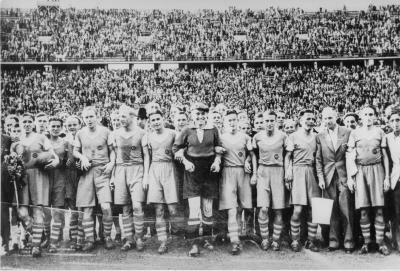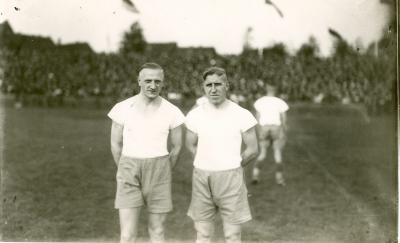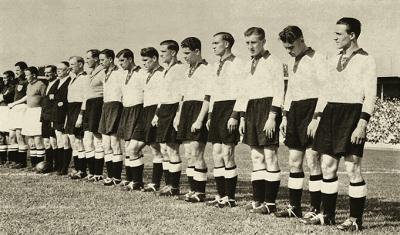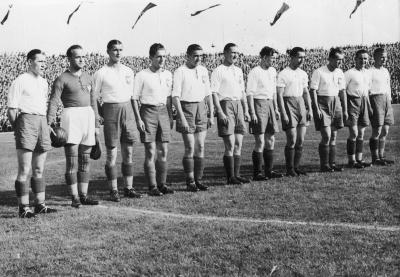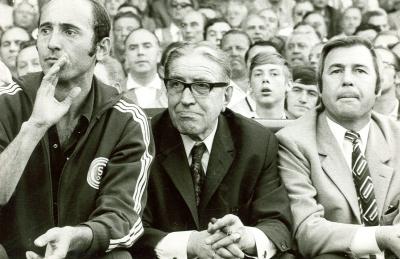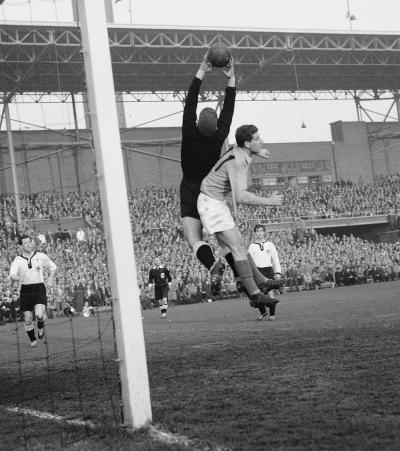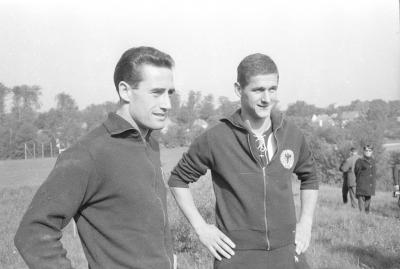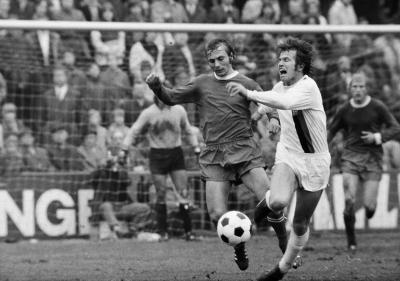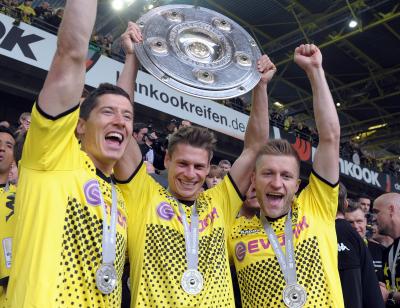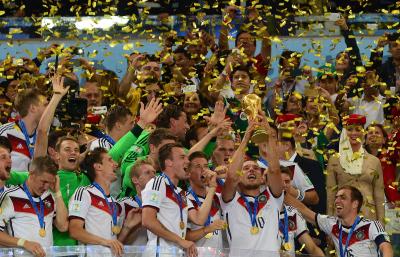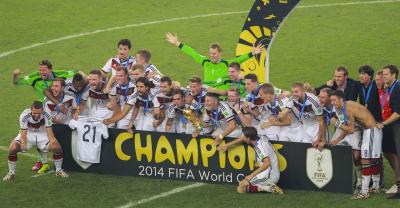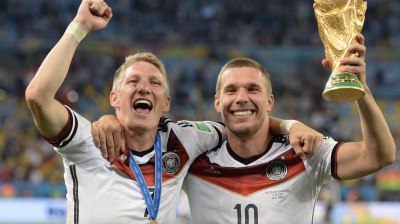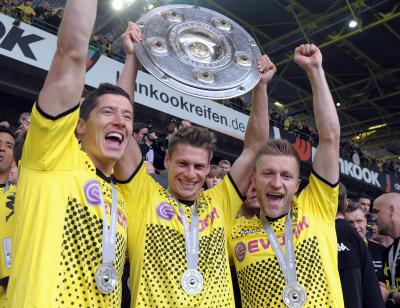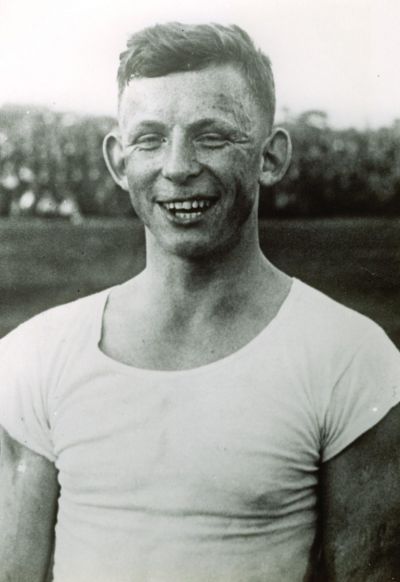From the “pit” to the professional league: Poles and Masurians in Ruhr area football
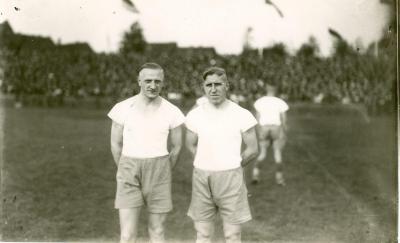
Women footballers with a Masurian or Polish migration background
As early as the 1950s, after the Second World War women's football teams also developed in the Ruhr area – despite the ban imposed by the German Football Association (DFB). These formed the basis for an unofficial national team. Two important personalities among the early pioneers of women's admission into football and the fight against their discrimination by the DFB, which lasted until 1970, were Brunhilde Zawatzky of Fortuna Dortmund and Lore Karlowski of Kickers Essen. Both women came from families with an immigrant background. Lore Karlowski's father came from a Masurian family and worked as a miner at the Nordstern colliery. At the age of sixteen, Lore made football history when she ran out against Holland in front of 18,000 spectators at the first international match played by an unofficial German women's national football team on 23rd September 1956 in the Mathias Stinnes Stadium in Essen. The German team won 2-1.
The professional era: Emigrants and “Legionnaires”
After the introduction of the Bundesliga and professionalism in German football in the 1963/64 season, the German market also became attractive for Polish players. The first Pole to play for a German club in the region was Waldemar Piotr Słomiany, who played for Schalke between 1967-1970 and moved to the “Pit” from the Upper Silesian mining area of Górnik Zabrze and a club that proudly bears its mining heritage in its name. Since the fall of the Iron Curtain in 1989/90 German and Polish football has become even closer. And since the 2012 European Championships in Poland and the Ukraine at the latest, this proximity has moved into the public eye. The Polish trio Łukasz Piszczek, Jakub Błaszczykowski and Robert Lewandowski played an outstanding role in the Borussia Dortmund team that were German Champions in 2011 and 2012. In Poland the club was given the benevolent tab, “Polonia Dortmund”, a name that follows on from the great era of the Ruhr region club Schalke 04 with its many players with Polish and Masurian names from the Polish coal-mining community. In spring 2014, a total of 23 Polish players were under contract in the three professional leagues of German football. German players from the milieu of Polish immigrants, like Miroslav Klose and Lukas Podolski, both of whom were born in Poland, were also among the top performers in the German national team which won the World Cup in Brazil in 2014.
And the game goes on. Not only in view of the current two million Germans with Polish family backgrounds, the hope remains that football will build another bridge between the neighbouring countries of Germany and Poland.
Diethelm Blecking, august 2019
Further reading:
Blecking, Diethelm, Von Willimowski zu Lewandowski: Die Rolle polnischer Spieler im deutschen Elitefußball, in: Dossier, Bundesliga Spielfeld der Gesellschaft, Bundesanstalt für politische Bildung 2014 (http://www.bpb.de/gesellschaft/medien-und-sport/bundesliga/192009/polnische-spieler-im-deutschen-elitefussball).
Blecking, Diethelm, Die Nummer 10 mit Migrationshintergrund, Fußball und Zuwanderung im Ruhrgebiet, in: Aus Politik und Zeitgeschichte, 1-3/2019, pp. 24-29 (http://www.bpb.de/apuz/283266/fussball-und-zuwanderung-im-ruhrgebiet).
Huhn, Daniel/ Metzger, Stefan, Eingewandert, ausgewandert und weitergespielt, in: Dietmar Osses (ed.), Von Kuzorra bis Özil. Die Geschichte von Fussball und Migration im Ruhrgebiet, Essen 2015, pp. 49-57.
Lenz, Britta, Vereint im Verein? Städtische Freizeitkultur und die Integration von polnischen und masurischen Zuwanderern im Ruhrgebiet zwischen 1900 und 1939, in: Archiv für Sozialgeschichte 2006, pp. 183-203.
Lenz, Britta, „Gebürtige Polen“ und „deutsche Jungen“, Polnischsprachige Zuwanderer im Ruhrgebietsfußball im Spiegel von deutscher und polnischer Presse der Zwischenkriegszeit, in: Diethelm Blecking et al. (ed.), Vom Konflikt zur Konkurrenz: Deutsch-polnisch-ukrainische Fußballgeschichte, Göttingen 2014, pp. 100-113.
Mandic, Vanja, Lore Barnhusen, geborene Karlowski, Nationalspielerin trotz Verbots, in: Dietmar Osses (ed.), Von Kuzorra bis Özil. Die Geschichte von Fußball und Migration im Ruhrgebiet, Essen 2015, pp. 154-155.


